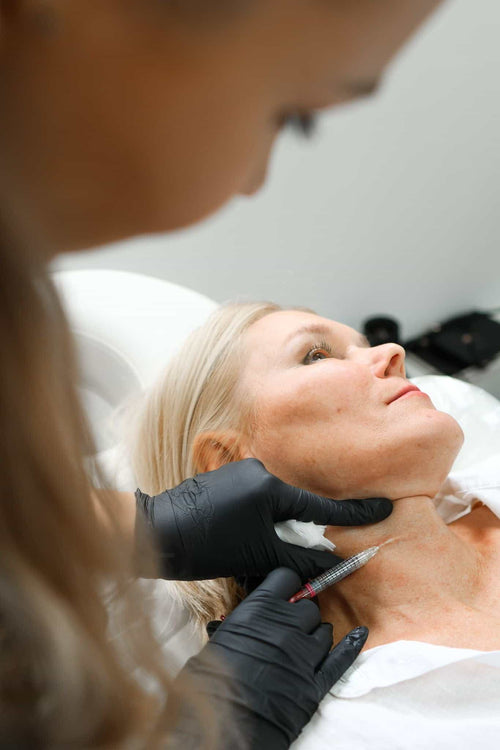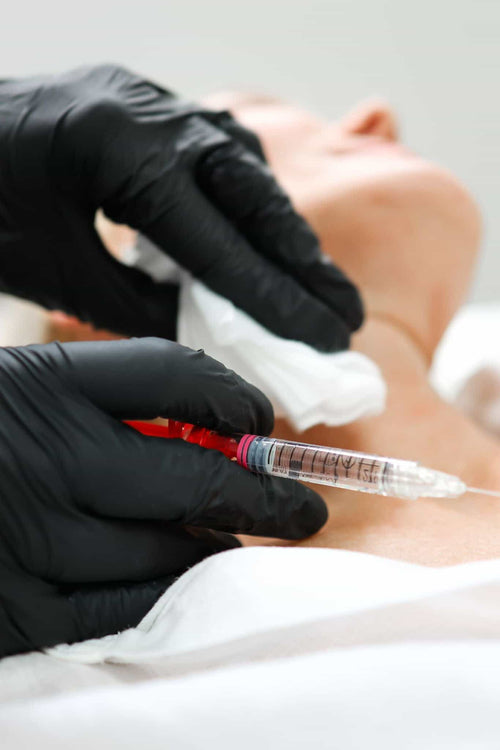Arrange Your Dermal Filler Consultation with Dr. Laura Geige
Immediate Relief
Cold Compress
Immediate relief from lip filler swelling can be achieved using a cold compress.

Applying a cold compress to the area helps constrict blood vessels, which in turn reduces inflammation and minimizes swelling.
A common method is to use ice wrapped in a thin cloth or a reusable gel pack.
Apply the cold compress for 10-15 minutes at a time, several times throughout the day.
Ensure that you don’t apply ice directly to the skin as it can cause damage.
Keep in mind that while cold compresses provide temporary relief, they do not address the underlying cause of swelling.
It’s essential to follow your practitioner’s aftercare instructions and avoid any activities that could increase inflammation or pressure on the treated area.
Elevate Your Head
Immediate relief from swelling after lip filler treatment can be achieved by implementing certain strategies right away.
One of the most important steps is to **elevate your head** while resting. This helps reduce blood flow to the area, minimizing fluid buildup and subsequent swelling.

Use an additional pillow or two under your head to ensure your upper body is slightly elevated.
Apply a *cold compress* to the swollen area for short periods throughout the day. Ice packs wrapped in a towel can be effective. The cold helps constrict blood vessels, further reducing swelling and inflammation.
Avoid touching or massaging your lips excessively as this can irritate the area and worsen swelling.
Refrain from any strenuous activity that could increase blood flow to the face.
Stay hydrated by drinking plenty of water. This helps flush out excess fluid and promotes healing.
Minimizing Long-Term Swelling
Gentle Massage
Minimizing long-term swelling after lip filler treatment involves a combination of post-treatment care and lifestyle adjustments.
One technique that can be beneficial is **gentle massage**. This helps to encourage lymphatic drainage, which is crucial for reducing fluid buildup and inflammation.
Here’s how to perform gentle massage on swollen lips:
1. **Wash your hands thoroughly:** Hygiene is paramount to prevent infection.
2. **Use a clean, light touch:** Avoid pressing too hard, as this can cause further irritation and bruising.
3. **Start with circular motions:** Gently massage in small circles around the lips, starting at the injection site and working outwards towards the center of your face.
4. **Repeat for a few minutes:** Continue this gentle massage several times a day, especially during the initial 24-48 hours after treatment.
5. **Elevate your head:** Sleeping with an extra pillow can help promote drainage and reduce swelling overnight.
While gentle massage can be helpful, it’s essential to follow all post-treatment instructions provided by your practitioner.
They may recommend other techniques like applying ice packs or using arnica cream, along with specific medications to minimize inflammation.
Arrange a Dermal Filler Consultation with Dr. Laura Geige Today
Over-the-Counter Medications
Minimizing long-term swelling after lip filler injections involves a multi-pronged approach that combines immediate post-procedure care, over-the-counter medications, and lifestyle modifications.
Here are some strategies to help reduce lingering swelling:
-
Cold Compresses: Applying cold compresses immediately after the procedure and for the following 24-48 hours can significantly minimize initial swelling.
-
Elevation: Keeping your head elevated while sleeping can help reduce fluid buildup in the face, aiding in faster recovery.
-
Gentle Massage:**
Once the initial swelling subsides (typically after 24 hours), gently massaging the treated area can help disperse any remaining inflammation.
-
Arnica: Arnica, available as a cream or gel, is a natural remedy known for its anti-inflammatory properties. Applying it to the lips may help reduce swelling and bruising.
-
Bromellain: This enzyme found in pineapple can aid in breaking down proteins associated with inflammation. Taking bromelain supplements as directed by your doctor may be beneficial.
**Over-the-Counter Medications:**
-
Antihistamines: Over-the-counter antihistamines like cetirizine (Zyrtec) or loratadine (Claritin) can help reduce inflammation and allergic reactions.
-
**Pain Relievers:** Ibuprofen or naproxen can manage any pain associated with swelling.
**Important Considerations:**
-
Always consult your doctor before taking any new medications, even over-the-counter ones.
-
Follow the dosage instructions on all medications carefully.
-
Be aware of potential side effects and interactions with other medications you may be taking.
Consult with Dr. Laura Geige for Dermal Fillers Now
Following these tips can help minimize long-term swelling after lip filler injections and promote a smoother, more natural-looking result.
When to Seek Professional Help
Signs of Infection
Lip filler swelling is a common side effect and typically resolves on its own within a few days to a week. However, there are instances when seeking professional medical help is crucial.
Here’s when you should reach out to your injector or a healthcare professional:
-
Severe Swelling: If the swelling is excessive, doesn’t improve after a week, or extends beyond your lips to your face or neck, seek immediate medical attention. This could indicate a serious reaction.
-
Difficulty Breathing or Swallowing: If you experience any difficulty breathing or swallowing, this is a medical emergency and requires immediate hospitalization.
-
Signs of Infection: Look out for signs such as redness, warmth, pus, pain that worsens over time, or fever. These are all indicators of a possible infection which needs prompt treatment with antibiotics.
-
Unexpected Changes in Vision or Speech: Any sudden changes in vision or speech should be addressed by a medical professional immediately, as it could signify a neurological complication.
-
Unsettling Numbness or Tingling:** If you experience persistent numbness or tingling around your lips that doesn’t subside within a few days, consult with your doctor.
Recognizing and addressing potential complications promptly is crucial for ensuring the best possible outcome after lip filler treatment.
Excessive or Persistent Swelling
Excessive or persistent swelling after lip filler injections can be concerning, and understanding when to seek professional help is crucial for ensuring optimal outcomes.
Here are some indicators that warrant contacting your injector or a qualified medical professional:
- Swelling that significantly exceeds what is expected for the procedure.
- Persistent swelling beyond the initial 2-3 days, especially if it’s accompanied by increasing pain, redness, or warmth.
- Swelling that spreads to areas beyond the injection site, suggesting potential migration of filler material.
- Symptoms of infection, such as fever, chills, pus discharge, or severe pain.
- Difficulty breathing or swallowing due to excessive swelling.
- Appearance of any unusual lumps, bumps, or asymmetry in the treated area.
Prompt medical attention is particularly important if you experience any allergic reactions, such as hives, itching, rash, or difficulty breathing. In these cases, seek emergency medical care immediately.
Remember, it’s always better to err on the side of caution when it comes to your health and well-being. Consulting a professional can help address any concerns promptly and minimize potential complications.
Arielle Likes to Cook Create Cocktails at Home Bend and Blossom Detailed Weddings LA
- Upper Face Anti Wrinkle Treatment Near Shalford, Surrey - January 4, 2025
- Fire Play Fetish: Sensual Heat And Controlled Flames - January 2, 2025
- Skin Pen Microneedling Near Chobham, Surrey - January 2, 2025
